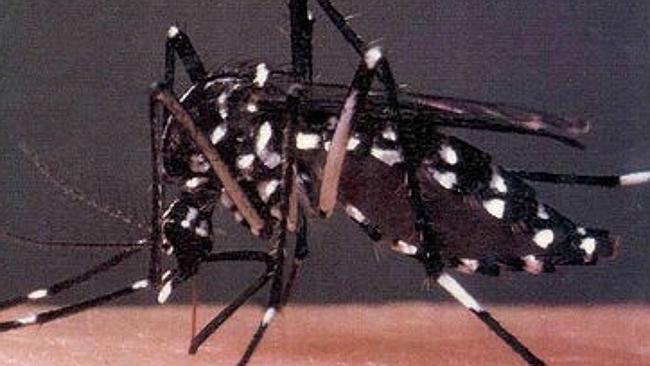Researchers at the Pasteur Institute in Paris has filmed a mosquito’s mouthparts into the flesh of a mouse hitting and draining a vein. Courtesy Choumet et al PLOS 2012
EXOTIC mosquitoes with the potential to spread crippling diseases have been found at Brisbane International Airport three times in the past two months, forcing heightened biosecurity measures.
The cargo holds of planes from select South-East Asian countries are being fumigated following the discovery of the Aedes aegypti mozzies, which can carry viruses such as dengue, chikungunya and yellow fever.
The bloodsuckers, which have distinct black and white striped legs, are the cause of annual dengue outbreaks in North Queensland but have not been routinely detected in Brisbane.
They were discovered in the international terminal baggage make-up area on February 17, March 30 and March 31.
Authorities say if a small number of the pests had not been detected, they would have spread exponentially throughout the area surrounding the airport and become a health threat.

The much-feared Aedes aegypti, or Asian tiger mosquito. Source: Supplied
“Targeted aircraft landing in Brisbane from certain South-East Asian airports will now have their cargo holds fumigated, before luggage is unloaded,” Federal Minister for Agricultural Barnaby Joyce said.
“This is in addition to the trapping and surveillance activities Department of Agriculture staff undertake, as well as the knockdown fogging, surface spraying, and treatment of standing water undertaken by the airports following an exotic mosquito detection.”
Mr Joyce said tests were being carried out to determine the most likely origin of the mosquitoes.
The same biosecurity measures were rolled out in international airports in Perth, Adelaide and Melbourne following the discovery of exotic mosquitoes in cargo holds.
“This will allow us to better target our efforts to make sure none of these mosquitoes enter and establish in Australia, which could have a devastating impact on our human and animal health,” Mr Joyce said.
Sixty-seven people in Queensland’s southeast have contracted dengue fever this year but in all cases they caught the disease while overseas, mainly in Asian countries such as Indonesia and Thailand.
Fourteen cases of chikungunya have also been reported in the southeast this year.

